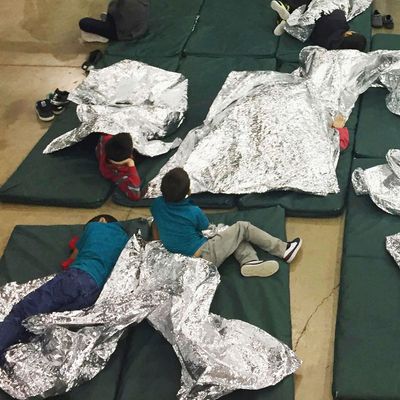
Donald Trump has taken the legal right to live in the United States away from 1 million of our country’s longtime residents. He has closed America’s shores to refugees from the Syrian civil war; encouraged federal authorities to terrorize undocumented communities; banned visitors from a wide variety of Muslim-majority nations; and taken Dreamers hostage.
These policies have prompted protests. Many poll poorly; all represent significant departures from American political norms. And the president has not felt compelled to abandon a single one of them.
And yet, on Wednesday, Trump did abandon his administration’s policy of separating migrant families that cross the U.S. border illegally. His executive order ending “family separation” is unlikely to withstand legal scrutiny. The new regime of family detention that it establishes is logistically problematic and morally unacceptable. It is unclear how long it will take for authorities to reunite the thousands of families that have already been separated — but certain that the traumas our government inflicted on hundreds of migrant children will still be with them long after Donald Trump has left this Earth.
Nevertheless, the White House retreated. A broad, bipartisan coalition was mobilized by its outrage at the administration’s cruelty toward non–U.S. citizens — and forced the president to change a policy he’d previously refused to identify as his own.
There are many sound explanations for this come-from-behind victory for human decency. But here’s one: It is very difficult to demonize immigrants who are still in diapers.
The White House was acutely aware of this challenge. When the Fourth Estate asked to see where our government was keeping migrant children who’d been separated from their parents, the administration directed them to a single facility in Brownsville, Texas — where only boys 10 and older were housed. Thus, the first images of such migrants in the U.S. media were exclusively of prepubescent and teenage males; which is to say, the kind of children that the right is most adept at demonizing.
To present a nonwhite teenage boy as a full-grown “thug” is no great challenge for the American reactionaries. In fact, some of Donald Trump’s favorite immigrants to dehumanize are teenage boys — namely, the junior members of the street gang MS-13.
But 2-year-old girls are another ball game. It is hard to argue that crying infants are “animals” who want to “infest our Country,” and infect it with crime. When most Americans look at an anguished toddler, they do not see an “illegal” who threatens to “strongly and violently” change their nation’s culture. Evolutionary pressures instilled in human beings an inclination toward tribalism; but it gave us an even stronger affinity for small children.
This reality has long pervaded our politics. As Vox’s Matt Yglesias recently noted, there is a reason the Children’s Defense Fund — an organization that advocates for aid to impoverished families (among other things) — is not called the “Indigent Parents Defense Fund.” Children are blameless and unthreatening. The fact of their humanity — and thus, of our collective moral obligation to spare them needless suffering — is harder to obscure, no matter how badly certain politicians might want us to mistake them for virus-bearing insects.






























